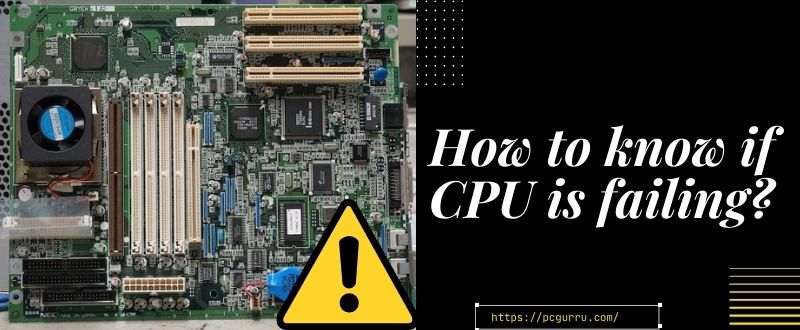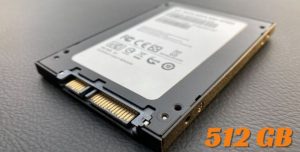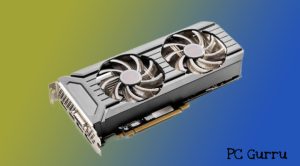How to know if the CPU is failing? Your computer’s CPU might be one of the most important components, but it’s also one of the least understood. When your CPU isn’t functioning as well as it should, your computer will slow down and you may even notice that it performs worse than it did when you first bought it, regardless of how many more powerful programs you have running on it now. This guide will help you figure out what to look for when your CPU starts to fail so that you can replace it before your computer becomes unusable or suffers permanent damage. How to know if the CPU is failing you will learn in more detail in this blog post.
Multiple Program Crashes
Whenever your computer crashes, there is likely a problem with your CPU. When you lose power to your CPU for a long period or leave it on for an extended period, heat can build up and become trapped inside your laptop or desktop. This could cause a chip to go bad in as little as two months! The key to avoiding such issues? Keep multiple programs running simultaneously whenever possible; doing so will help ensure that enough eyes are monitoring any irregularities occurring within your system’s circuitry. It will also make sure you catch signs of CPU failure early on rather than waiting for something more serious to occur.
You should also keep your laptop plugged into a charger whenever possible, even if you’re just watching videos online or reading emails. Batteries should never be allowed to fully drain because they’re not meant to hold a charge while they’re empty—and batteries often fail before their time due to poor maintenance. If you want your computer to last as long as possible, treat it like an egg: don’t let it get too hot, and don’t let it get too cold!
Random Freezes
The most common sign of CPU failure is when your computer freezes for no apparent reason. You might have a document open, or an important spreadsheet might be mid-calculation. Whatever you’re doing at that moment, everything just stops—while you stand helplessly and wait for it to come back to life. If your laptop freezes with any frequency, consider it a red flag that there’s a problem with your CPU—and possibly other components on your motherboard. Start by having them all checked by a professional, especially if it happens more than once or twice in two months. Otherwise, run diagnostics (like those found on PCMag) to find out what’s going wrong.
This could take hours, but at least you won’t be staring blankly into space while waiting for your computer to unfreeze!
System Hangs
How to know if the CPU is failing? A CPU can fail in any number of ways, but one of the most obvious signs that something’s wrong is a system hang. If your computer stops responding and displays an error message, it means that it has become overloaded with information, and needs to be shut down and restarted. Most cases of system hangs are minor issues, so don’t panic too much if you encounter one; it’s usually a sign that your processor needs to be upgraded or replaced. However, system hangs can also point to other issues with your computer—particularly if you’re repeatedly encountering them when trying to perform a specific task.
For example, if you’ve been working on a large spreadsheet for hours and your computer suddenly freezes, it could mean that there’s a problem with your hard drive.
Read also: Are MSI laptops good?
Increased Boot-Time
If your computer takes a long time to boot up, you may have a CPU failure. If there’s an operating system that won’t load and gets stuck at random stages of the booting process, you could be looking at a bad CPU. You can attempt to diagnose it by unplugging all unnecessary peripherals from your laptop or desktop computer and turning off extra services (firewall, antivirus program). A common mistake many people make with their computers is overclocking them. Although overclocking might provide additional performance boosts for a short period, it can cause bigger problems in terms of longevity as it places more strain on your hardware which could cause your CPU to fail quicker than usual. The CPU is also one of the most important components of your computer so try not to leave it exposed for too long without proper cooling.
Some examples include placing your laptop on bedding or inside a pillowcase where heat will build up quickly due to poor ventilation. Make sure your CPU has adequate cooling either through active cooling methods such as fans or passive ones such as heat sinks/radiators. The easiest way to tell if you’re experiencing CPU failure is through its symptoms: Slow loading times, glitches during gameplay/movie playback, crashes during games/video rendering, and slow shutdowns are just some examples of what you should look out for when diagnosing if you’ve got a faulty CPU.
Score Reduced by Over 20%
A CPU slowdown (how fast it’s processing) of more than 20% could indicate impending failure. If you have a desktop, a slowdown of more than 20% can also mean imminent failure. If you notice unusual sounds coming from your computer or notice that programs are slower to load, these could also be signs of failing CPU power. Even if your computer isn’t slowing down, CPU failure is still an issue because there’s no way to know when your CPU will die.
That’s why all laptops should have surge protection—to protect against sudden surges in electricity like those caused by lightning strikes. However, if you have a laptop without surge protection and experience symptoms of CPU failure (slowing down), you might want to consider replacing it as soon as possible before damage occurs.
Tasks Are Slow To Complete
How to know if the CPU is failing? If your computer’s tasks take longer than normal to complete, you’re not alone. If it’s taking a long time for your computer to boot up, and individual programs run slowly after you open them, you may be experiencing CPU failure. Restarting your computer normally clears these issues but if they continue to pop up regularly, it may be time to invest in new hardware. Knowing how to identify signs of CPU failure can save you thousands of dollars on an unnecessary upgrade.
It can also help prevent data loss that might occur from damaged hard drives or memory problems. A damaged CPU can cause software crashes and slow performance across all programs running on your computer, so identifying these signs is important. However, if you do experience any of these symptoms, don’t automatically assume that your CPU has failed—it could just be something else entirely.
Try troubleshooting first before jumping to conclusions or investing in a new CPU that isn’t necessary yet. Check out our guide below for more information about signs of CPU failure!
Gaming Performance Dropped
How to know if CPU is failing? Many laptop owners use their computers for more than just surfing Facebook. If you’re running resource-intensive programs, such as a graphical processing unit (GPU) for gaming or a CPU-heavy program like Google Earth, your computer will run hotter and draw more power. To extend your computer’s lifespan and avoid damaging it beyond repair, take note of signs of CPU failure before they get worse. While not always indicative of an actual issue with your hardware, these symptoms are worth paying attention to. For example, if your computer takes longer than usual to start up, make sure all its internal components are seated properly and clean any dust out of vents or fans. If you notice that your computer heats up quickly even when it isn’t doing much, consider adding additional cooling devices like a laptop fan.
In some cases, computers can overheat because there isn’t enough airflow inside them – so keep those vents clear! Even if nothing seems amiss when you check on things from time to time – play games on laptops often enough and eventually signs of CPU failure may become apparent. Paying attention to temperature levels while playing can help prevent overheating – especially in laptops where heat can build up quickly due to lack of space inside.
PC Shuts Down Unexpectedly
This might be caused by a variety of reasons. Perhaps your computer has been left on for an extended period and you’ve forgotten about it, causing it to overheat. Or maybe you have a virus in your computer that’s slowing down its operations. Or it could simply be that your CPU is failing. Assuming you notice your Laptop haphazardly shutting down, it probably implies your CPU needs substitution. Most Laptops have welded CPUs, so you’ll have to send them for a fix or buy another Laptop.
Either way, you can assume that if your CPU has failed, it won’t be usable until you take action to resolve its problems. It’s not worth risking further damage to your computer just because you don’t want to spend money on repairs. Get your CPU fixed as soon as possible before it causes any more damage.
Read also: Why is a laptop useful?
Screen Flickering at Startup or While Loading Programs
When your laptop’s screen flickers at start-up or while loading programs, it’s often a sign that something went wrong during manufacturing and that you have a defective CPU. In other words, it won’t work forever, even if you replace all of its parts. If your computer has been running fine up until now, don’t worry about it; if it started flickering suddenly—like after a recent hardware upgrade—the culprit might be your new addition. The good news is that replacing a CPU is easy with some basic hardware tools and about half an hour (depending on what kind of laptop you have).
Shorter Battery Life between Charges
How to know if the CPU is failing? If your laptop battery doesn’t last as long between charges, it could be a sign that it’s time to change out your battery. This can be an expensive (and wasteful) proposition and might not be worth it if you’re hoping to squeeze a few more months of use out of your laptop before buying a new one. If you still want to replace your battery, contact your computer manufacturer. They might offer extended warranties or insurance policies that cover parts and labour for free.
But before shelling out any cash, learn about all of your options by reading about what you can do when a laptop’s CPU dies or by considering whether or not it’s cost-effective to repair. You might also consider replacing your laptop instead of fixing it—if your computer is older than four years, you probably don’t have much choice in the matter.








